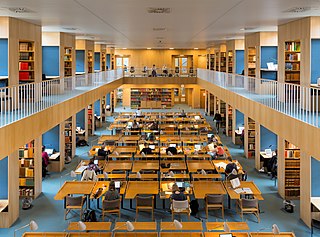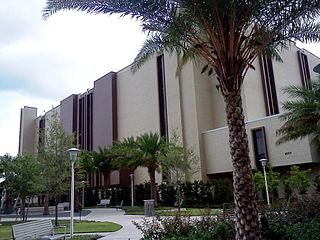Related Research Articles

A library is a collection of materials, books or media that are accessible for use and not just for display purposes. A library provides physical or digital access materials, and may be a physical location or a virtual space, or both. A library's collection can include printed materials and other physical resources in many formats such as DVD, CD and cassette as well as access to information, music or other content held on bibliographic databases.
The reference desk or information desk of a library is a public service counter where professional librarians provide library users with direction to library materials, advice on library collections and services, and expertise on multiple kinds of information from multiple sources.

This page is a glossary of library and information science.

A librarian is a person who works professionally in a library providing access to information, and sometimes social or technical programming, or instruction on information literacy to users.

A research library is a library which contains an in-depth collection of material on one or several subjects. A research library will generally include an in-depth selection of materials on a particular topic or set of topics and contain primary sources as well as secondary sources. Research libraries are established to meet research needs and as such are stocked with authentic materials with quality content. Research libraries are typically attached to academic or research institutions that specialize in that topic and serve members of that institution. Large university libraries are considered research libraries, and often contain many specialized branch research libraries. The libraries provide research materials for students and staff of these organizations to use and can also publish and carry literature produced by these institutions and make them available to others. Research libraries could also be accessible to members of the public who wish to gain in-depth knowledge on that particular topic.

Questia was an online commercial digital repository of books and articles that had an academic orientation, with a particular emphasis on books and journal articles in the humanities and social sciences. All the text in all the Questia books and articles were available to subscribers; the site also included integrated research tools. As of December 21, 2020, it ceased operations.
Digital reference is a service by which a library reference service is conducted online, and the reference transaction is a computer-mediated communication. It is the remote, computer-mediated delivery of reference information provided by library professionals to users who cannot access or do not want face-to-face communication. Virtual reference service is most often an extension of a library's existing reference service program. The word "reference" in this context refers to the task of providing assistance to library users in finding information, answering questions, and otherwise fulfilling users’ information needs. Reference work often but not always involves using reference works, such as dictionaries, encyclopedias, etc. This form of reference work expands reference services from the physical reference desk to a "virtual" reference desk where the patron could be writing from home, work or a variety of other locations.
The California Digital Library (CDL) was founded by the University of California in 1997. Under the leadership of then UC President Richard C. Atkinson, the CDL's original mission was to forge a better system for scholarly information management and improved support for teaching and research. In collaboration with the ten University of California Libraries and other partners, CDL assembled one of the world's largest digital research libraries. CDL facilitates the licensing of online materials and develops shared services used throughout the UC system. Building on the foundations of the Melvyl Catalog, CDL has developed one of the largest online library catalogs in the country and works in partnership with the UC campuses to bring the treasures of California's libraries, museums, and cultural heritage organizations to the world. CDL continues to explore how services such as digital curation, scholarly publishing, archiving and preservation support research throughout the information lifecycle.
Serials Solutions was a division of ProQuest that provided e-resource access and management services (ERAMS) to libraries. These products enabled librarians to more easily manage electronic resources that serve the needs of their users. Serials Solutions became part of ProQuest Workflow Solutions in 2011 and the "Serials Solutions" name was retired in 2014. In 2015, Proquest acquired Ex Libris Group, a library automation company with many similar products to those of ProQuest Workflow Solutions. The Workflow Solutions division was to be merged with Ex Libris into a new business group called Ex Libris, a ProQuest Company.

Project MUSE, a non-profit collaboration between libraries and publishers, is an online database of peer-reviewed academic journals and electronic books. Project MUSE contains digital humanities and social science content from over 250 university presses and scholarly societies around the world. It is an aggregator of digital versions of academic journals, all of which are free of digital rights management (DRM). It operates as a third-party acquisition service like EBSCO, JSTOR, OverDrive, and ProQuest.

The Texas A&M University Libraries support the teaching, research, and outreach missions of Texas A&M University through leadership in acquiring, managing, and delivering information in an environment that fosters learning and inquiry. In particular, Texas A&M is nationally and internationally recognized for many research collections, including:
ERAMS are a way of thinking about library management to help libraries optimize the access, usage, data, and workflows of electronic library collections in the physical and digital library.

A special library is a library that provides specialized information resources on a particular subject, serves a specialized and limited clientele, and delivers specialized services to that clientele. Special libraries include corporate libraries, government libraries, law libraries, medical libraries, museum libraries, news libraries. Special libraries also exist within academic institutions. These libraries are included as special libraries because they are often funded separately from the rest of the university and they serve a targeted group of users.
OverDrive, Inc. is a digital distributor of eBooks, audiobooks, online magazines and streaming video titles. The company provides digital rights management and download fulfillment services for publishers, libraries, schools, corporations and book retailers.
Minitex is a publicly supported information and resource sharing program for academic, government, public and specialized libraries in the states of Minnesota, North Dakota, South Dakota, and with partners in Wisconsin and Iowa. Minitex was created as a pilot project, initially funded in 1968 through a grant from the Louis and Maude Hill Foundation and state and federal grant funds from the Minnesota State Department of Education.
A pathfinder is a bibliography created to help begin research in a particular topic or subject area.. Pathfinders produced by the Library of Congress are known as "tracer bullets". What is special about a pathfinder is that it only refers to the information in a specific location, i.e. the shelves of a local library.

The Catalog of Digital Historical Newspapers (NewspaperCat) is a free online resource for open-access digitized historical newspapers published in North America and the Caribbean. NewspaperCat was developed from a grant by the George A. Smathers Libraries at the University of Florida and is powered by SobekCM, the content management system used by the University of Florida Digital Collections.

E-book lending or elending is a practice in which access to already-purchased downloads or online reads of e-books is made available on a time-limited basis to others. It works around the digital rights management built into online-store-published e-books by limiting access to a purchased e-book file to the borrower, resulting in loss of access to the file by the purchaser for the duration of the borrowing period.

The University of South Florida Tampa Library is the main research library for the University of South Florida. Housing over 1.3 million books, academic journals and electronic resources, including 52,000 e-journal subscriptions, 443,000 e-books, and over 800 databases, the library has more than 2 million visitors each year. The library offers tutoring and writing services, laptops, a career resource center, and course reserves. The facility houses several special and digital collections, including literature, oral histories, photographs, artifacts, and the university archives. The current Dean of USF Libraries is Todd Chavez.
Covenant University Library, also known as Centre for Learning Resources (CLR), is the library of Covenant University in Ota, Ogun State, Nigeria. It is housed in a three-story glass building with a seating capacity of 3,500.
References
- 1 2 "About Us". Florida Electronic Library. Retrieved 26 November 2018.
- ↑ "FAQs". Florida Electronic Library. Retrieved 26 November 2018.
- ↑ "Florida Electronic Library". Florida Atlantic University Libraries. Retrieved 26 November 2018.
- ↑ "Interests". Florida Electronic Library. Retrieved 26 November 2018.
- ↑ "Ask a Librarian". Ask a Librarian. Retrieved 26 November 2018.